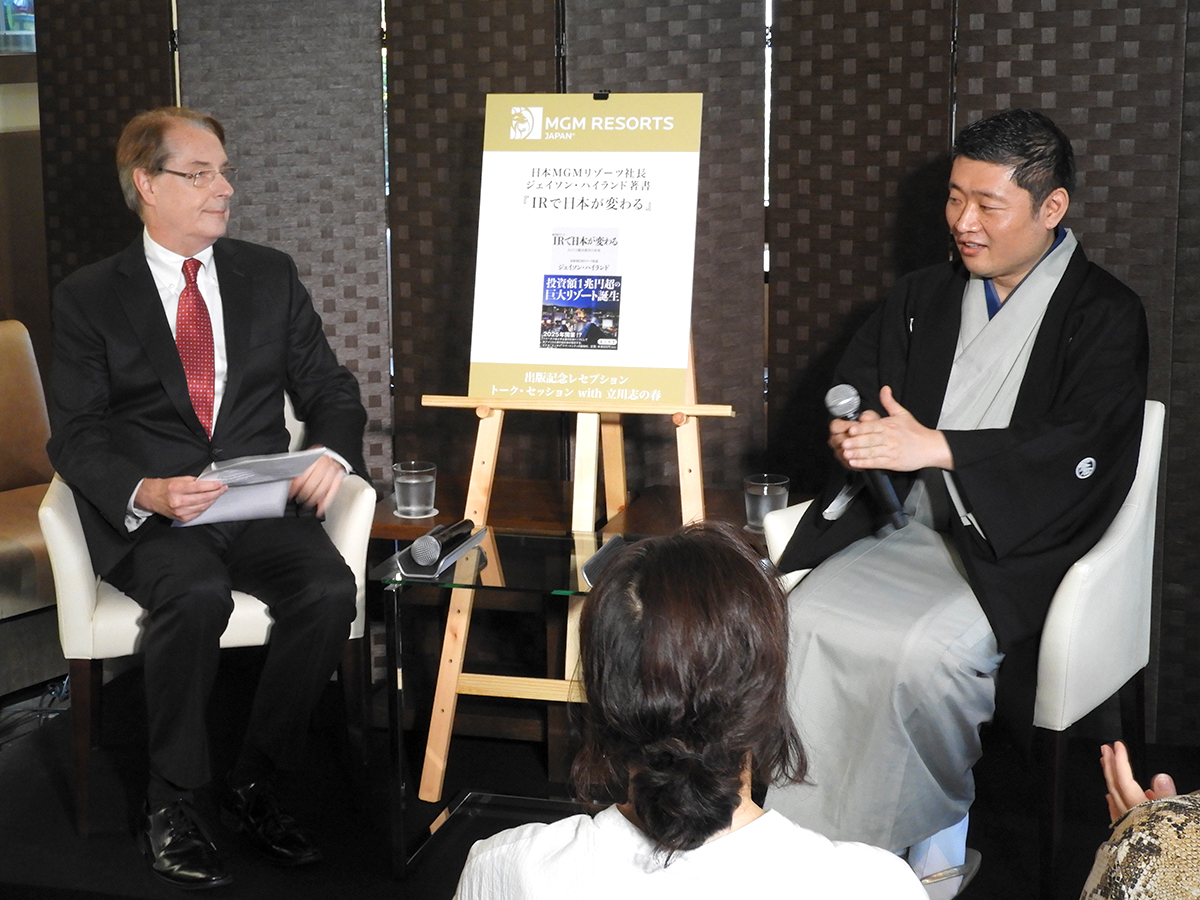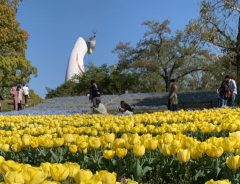
Photo: © grape Japan
MGM Resorts Japan LLC’s Jason P. Hyland Explains His Vision For Integrated Resorts
- Tags:
- Book / casino / conference center / entertainment / Hotel / Integrated Resort / IR / Ivy Place / Jason P. Hyland / Kadokawa / MGM Resorts / MGM Resorts Japan LLC / Mice / Osaka / rakugo / Smart city / Tatekawa Shinoharu / Yumeshima
Related Article
-

Mike Puts a Taste of Osaka into Popcorn with Takoyaki Flavour
-

We Visited The Cowboy Bebop Cafe in Akihabara And It Was Amazing!
-

Watch Japanese Cat Cafe Cats React Moments Before Osaka Earthquake
-

Meet Japan’s coolest space quartet at the BLUE HAMHAM POP UP STORE in Tokyo and Osaka
-

Sakura Season is Over, Time for Tulips at Osaka’s Expo Park
-

Smash Your Stress Away With Cloud’s Sword And Thor’s Hammer At Osaka’s New Rage Room


IR in Japan
Just about a year ago, Japan’s IR Implementation Bill was passed into law, opening the door to legalized casino gambling in Japan and officially launching a race to win one of three licenses to develop and operate what will become Japan's first Integrated Resorts, the term for major resort properties including a hotel with a casino, together with convention facilities, entertainment shows, theme parks, luxury retail and fine dining. With the Expo 2025 universal exposition to be held in Osaka, the city (and prefecture) is widely believed to be the first location permitted to host a resort. Wakayama and Nagasaki are the other two prefectures which have expressed support for an IR in Japan.
MGM Resorts Japan LLC
Among the international casino operators aiming to secure a license, MGM Resorts Japan LLC seems to be in an excellent position, having already established local ties through such activities such as partnering with a community in Japan's earthquake-hit northeastern region of Tohoku, conducting extensive on-site research to gain insight into Japanese gambling culture, and being the first operator to partner with a Japanese financial services group (Orix) in order to submit its proposal for Osaka. Yumeshima island, a land reclamation site in Osaka bay, is widely believed to be the likely site.
© Photo by grape Japan
Book launch party and talk event
On Friday, July 5th, at Ivy Place in the stylish T-Site complex in Daikanyama, Tokyo, MGM Resorts Japan LLC held an event to celebrate the launch of President and Representative Officer Jason P. Hyland's Japanese language book "IR de nihon ga kawaru ~ kajino to kankō toshi no mirai~" 『IRで日本が変わる ~カジノと観光都市の未来~』(Through IR, Japan will change: the future of casinos and sightseeing cities).
In an informal talk in which he explained his motivation for writing and his vision for Integrated Resorts in Japan, Hyland, a former career diplomat for over 30 years who served as the acting United States Ambassador to Japan in the first half of 2017, was joined by Tatekawa Shinoharu 立川誌の春, a Yale graduate who performs the traditional narrative comedy art of rakugo in English as well as Japanese. Fluent in both languages, the two men conducted the event first in Japanese, then in English.
© Photo by grape Japan
The following is an excerpt from the talk:
Motivation for writing
(Translated from Japanese)
Tatekawa Shinoharu (TS): Mr. Hyland (...), why did you decide to write this book?
Jason P. Hyland (JH): Well, I’ve been to many places and met with representatives of the community and business people. I understand that many of them have various concerns about IR. IR is a new industry and I think it’s natural that they have worries. As a former diplomat and someone who has been around Japan, I thought if I wrote a book, I could gain understanding of the Japanese people.
TS: What is the most important point you want to convey?
JH: IR is an ecosystem. Through innovation and entertainment, it will contribute to economic growth. I want people to understand this.
Making MICE
TS: (...) Before reading your book, I just had the image that IR was about casinos and hotels abut after reading it, I understood that it wasn’t only that. I learned that it would lead to connections with all kinds of [international] conferences and that many people abroad would learn about it, which would then lead to more tourism in Japan and more opportunities for people in the entertainment world such as myself. In other words, there are many possibilities.
Also, now I understand that MICE isn’t just the plural of the word mouse but that it stands for (M)eetings, (I)ncentive Travel, (C)onventions and (E)xhibitions/Events. It was a discovery for me that [the project] was so broad and that it related to entertainment to that extent.
(original English)
An entertainment ecosystem
TS: So, what is your vision?
JH: (...) This is the most exciting thing about this project because it really is an opportunity to create an ecosystem and a place for innovation and change. I compare it to Silicon Valley in that Silicon Valley is not a building. It's not one effort that created it. It's something that got a great start and then people came there because they saw that they could bring their ideas and high technology, and then related industries came.
I think that Las Vegas is an entertainment ecosystem like Silicon Valley. If you go to Las Vegas, outside the area where all the resorts are, you see all these companies that have sprung up, offering hi-tech services and musical performances or technology for projection mapping or all the things related to entertainment and hospitality.
© Photo by grape Japan
Smart cities
I think that with IR in Japan, I imagine that will become an incubator for innovation and entertainment but also for Smart cities. Because if you're talking about investment at this scale, you're really talking about a city, a city that has the best in technology for transportation, for hospitality, for everything. So, that's what I get most excited about. I think it's a place where you would have the very best architecture, a place that's always changing because the world of IR is one in which you want to bring new attractions and new experiences. That's what I think about when I think about the future of IR here.
Working with local communities
TS: How about the relationship with the existing local community?
JH: I think that's something that will be very strong. And our company puts particular effort into going early to places to meet people in the community, find out what people's concerns are, establish bonds and do things so that everyone grows together.
I was very impressed in Washington. We have a resort just outside Washington DC, and there's shopping and restaurant area nearby. The revenues are going up a third there because people are all looking for other places to go for new experiences. So I think that's very important. Coming from my diplomatic experience, that's something I feel very comfortable with: going to meet people and find out how they imagine it, what their concerns are and how we can be good neighbors and good corporate citizens.
TS: So it's going to be a win-win a situation with the local community.
JH: I really believe that.
© Photo by grape Japan
Japanese concerns about gambling
TS: There are concerns that some people may have about IR when it comes to gambling. What actions are you taking to address that?
JH: Well, it's a very serious issue. I think the issue of gambling problems, addiction, is something that we take very seriously. And we take it very seriously for Japan. In fact, we've been coming here with experts and creating bonds with local health professionals for years, well before this even became a law. Because you really have to have the respect of the local community and their appreciation that we will really be good neighbors, and take appropriate measures.
And so, we've been building those ties with stakeholders here, with experts. We're always ready to explain our policies. We have a program that I think is unique, called Game Sense, which is focused on responsible gaming. I think that this is just part of what will matter in terms of whether we can win the trust of the community, if we’re given the opportunity to operate. So, thanks for asking that.
Possibilities for entertainment and cultural exchange
TS: Other than that, I'm really excited about the entertainment aspect.
JH: (...) If you go to Las Vegas there are all kinds of super exciting artists and new performers, new things. But an equal part of what we're doing is introducing great Japanese artists to the world and finding ways that we can collaborate and create new things. So I think, rather than it being bringing Las Vegas to Japan, I think we're bringing an innovation and creative hub to Japan that guests, whether they’re Japanese or international, will really enjoy.
TS: Because that is one problem I have when I have visitors, friends from abroad, coming to Japan, and they ask me where I recommend for them to go. If I can go together with them, it’s fine... But if they don't speak Japanese, it's a bit difficult (...). So, if there are many options for places you can enjoy without being able to speak Japanese, that’s very good.
JH: I think that reminds me that being able to attract the top international conferences, whether it's medical conferences by major corporations [or otherwise], that [allows for] great cultural exchanges. You have these people who are experts in many fields coming here, but right now there really aren’t places that are big enough and with the facilities to accommodate them. So I think that, in itself, would be transformational. Everyone loves Japan and people will be thrilled to have the opportunity to come to a large international conference here. I think that will lead to a lot of further cultural interaction and be a great stimulus for the economy, and for technology as well.
One on one with the speakers
After the talk session, we had an opportunity to ask Jason P. Hyland and Tatekawa Shinoharu more questions about entertainment and Integrated Resorts.
Jason P. Hyland
grape Japan (gJ): Mr. Hyland, as far as entertainment is concerned, I think you mentioned that you’re thinking of incorporating some Japanese entertainment. But can you give us a bit more of an idea of how that’s going to work, what kind of elements you’re thinking about more specifically?
© Photo by grape Japan
JH: Well I think it’s a discovery because there’s amazing art in Japan and our goal is to bring more international visitors here and to be a gateway for Japanese culture for travel in Japan. So, we want to make that as attractive as possible for international visitors coming in. There’s a huge amount of art to choose from. So, that’s a wonderful project. And then there’s international entertainment and of course, we’re a world leader in that. And then, there may be opportunities to have fusion.
We’ve done a number of interesting things already. We’ve done kabuki, the former Somegoro-san (Ichikawa Somegoro VII) came to Las Vegas and did a very state-of-the-art performance at the Fountains of Bellagio together with TeamLab. We brought "Sekigahara," a very famous film, to Washington D.C. together with the Japan America Society. Through the vision of our chairman, we started an artist-in-residence program in Las Vegas at Bellagio. We had an artist, Kisho Mukaiyama, who was extremely successful. Now, the next artist is here tonight, SISYU-san, who is internationally renowned. And we see these as international collaborations. So, I think it’s a wonderful challenge to take the very best of Japan around the world and bring it to an audience that will bring international visitors as well as Japanese.
Tatekawa Shinoharu
(Translated from Japanese)
gJ: Shinoharu-san, in the talk session, it was mentioned that there may be an opportunity for rakugo to be involved in this IR project. According to you, what would be the ideal way in which that would happen?
© Photo by grape Japan
TS: Well, to put on an English rakugo performance for foreign tourists is very difficult. First, there are few people doing it, so we can’t create a situation where English rakugo is performed at a fixed time and place. But if there is an IR and foreigners come regularly there, we can envisage having English rakugo performances with a certain regularity, for example twice a month. (...)
I think the content of rakugo has universal appeal. It can be appreciated by people from various cultures. And when you consider the various comedy forms of the world, there aren’t too many which can be appreciated in the same performance space by audiences 5 years old to 90 years old. I think stand-up comedy is very interesting, but it appeals to a narrower audience demographic when it comes to age. There aren’t too many comedy forms which audiences young and old can casually enjoy and laugh at, so I hope IR can be a place where this appealing feature of rakugo will come across.
Links
Book information
If you can read Japanese, Jason P. Hyland's book, "IR de nihon ga kawaru ~ kajino to kankō toshi no mirai~" 『IRで日本が変わる ~カジノと観光都市の未来~』(Through IR, Japan will change: the future of casinos and sightseeing cities), is available on the Kadokawa Online Shop, Amazon.co.jp, and other online booksellers.